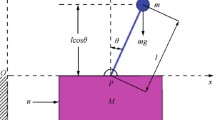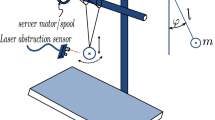Abstract
Much recently, based on the discrete-time nonlinear output regulation (NOR) theory, a neural network (NN) method combined with feedforward friction compensation was proposed to tackle the tracking problem of the linear motor-driven inverted pendulum on a cart (IPC) system, where the NN was used to approximate the solution of the discrete regulator equations (DREs) for the IPC system whose dimension is equal to the sum of the dimensions of the system state and the control input. However, it is quite tedious to calculate the approximate solution and the feedforward friction compensation requires a complicated off-line friction identification procedure. This paper proposes an improved NN method combined with adaptive friction compensation for this tracking problem. In particular, the NN is used to approximate a feedforward function instead of the solution of the DREs. Since the dimension of the feedforward function is the same as that of the control input, the computational efficiency is improved. Moreover, the adaptive friction compensator is easy to implement since it does not need to establish detailed friction model. Experimental results demonstrate that our control strategy can lead to much more satisfactory tracking performance compared with the existing NN control strategy.











Similar content being viewed by others
References
Ping Z, Liu C, Huang Y, Yu M, Lu JG (2021) Experimental output regulation of linear motor driven inverted pendulum with friction compensation. IEEE Trans Syst Man Cybern Syst 51(6):3751–3758
Lee J, Mukherjee R, Khalil HK (2015) Output feedback stabilization of inverted pendulum on a cart in the presence of uncertainties. Automatica 54:146–157
Boussaada I, Morǎrescu IC, Niculescu SI (2015) Inverted pendulum stabilization: characterization of codimension-three triple zero bifurcation via multiple delayed proportional gains. Syst Control Lett 82:1–9
Su X, Xia F, Liu J, Wu L (2018) Event-triggered fuzzy control of nonlinear systems with its application to inverted pendulum systems. Automatica 94:236–248
Wang M, Liu Y, Cao G, Owens DH (2020) Energy-based finite-time stabilization and \(H_\infty\) control of stochastic nonlinear systems. Int J Robust Nonlinear Control 30:7169–7184
Muskinja N, Tovornik B (2006) Swinging up and stabilization of a real inverted pendulum. IEEE Trans Ind Electron 14(6):1135–1144
Al-Araji AS (2019) An adaptive swing-up sliding mode controller design for a real inverted pendulum system based on Culture-Bees algorithm. Eur J Control 45:45–56
Kennedy E, King E, Tran H (2019) Real-time implementation and analysis of a modified energy based controller for the swing-up of an inverted pendulum on a cart. Eur J Control 50:176–187
El-Hawwary MI, Elshafei AL, Emara HM, Fattah HAA (2006) Adaptive fuzzy control of the inverted pendulum problem. IEEE Trans Control Syst Technol 14(6):631–639
Pan J, Qi S, Wang Y (2015) Flatness based active disturbance rejection control for cart inverted pendulum and experimental study. In: American control conference, Chicago, USA, pp 4868–4873
Rubio JDJ (2018) Discrete time control based in neural networks for pendulums. Appl Soft Comput 68:821–832
Zhang A, She J, Qiu J, Yang C, Alsaadi F (2019) Design of motion trajectory and tracking control for underactuated cart-pendulum system. Int J Robust Nonlinear Control 29(8):2458–2470
Huang J (2004) Nonlinear output regulation: theory and applications. SIAM, Philadelphia
Wang J, Huang J, Yau SST (2000) Approximate nonlinear output regulation based on the universal approximation theorem. Int J Robust Nonlinear Control 10(5):439–456
Liu Y, Wang J, Gao C, Tang S, Gao Z (2018) Input-to-state stability for a class of discrete-time nonlinear input-saturated switched descriptor systems with unstable subsystems. Neural Comput Appl 29(7):417–424
Liu YJ, Li S, Tong S, Chen CLP (2019) Adaptive reinforcement learning control based on neural approximation for nonlinear discrete-time systems with unknown nonaffine dead-zone input. IEEE Trans Neural Netw Learn Syst 30(1):295–305
Treesatayapun C (2020) Knowledge-based reinforcement learning controller with fuzzy-rule network: experimental validation. Neural Comput Appl 32(5):9761–9775
Zhang H, Lewis FL (2015) Adaptive cooperative tracking control of higher-order nonlinear systems with unknown dynamics. Automatica 48(7):1432–1439
Peng Z, Wang D, Zhang H, Lin Y (2015) Cooperative output feedback adaptive control of uncertain nonlinear multi-agent systems. Neurocomputing 149:132–141
Zhang J, Wang H, Cao Z, Zheng J, Yu M, Yazdani A, Shahnia F (2019) Fast nonsingular terminal sliding mode control for permanent magnet linear motor via ELM. Neural Comput Appl 32:14447–14457
Miao P, Wu D, Shen Y, Zhang Z (2019) Discrete-time neural network with two classes of bias noises for solving time-variant matrix inversion and application to robot tracking. Neural Comput Appl 31(9):4879–4890
Kong L, He W, Yang C, Li Z, Sun C (2019) Adaptive fuzzy control for coordinated multiple robots with constraint using impedance learning. IEEE Trans Cybern 49(8):3052–3063
Shojaei K (2019) Three-dimensional neural network tracking control of a moving target by underactuated autonomous underwater vehicles. Neural Comput Appl 31(2):509–521
Wang H, Xu Z, Do MT, Zheng J, Cao Z, Xie L (2015) Neural-network-based robust control for steer-by-wire systems with uncertain dynamics. Neural Comput Appl 26(7):1575–1586
Ye M, Wang H (2020) Robust adaptive integral terminal sliding mode control for steer-by-wire systems based on extreme learning machine. Comput Electr Eng 86:106756
Hu Y, Wang H, Cao Z, Zheng J, Ping Z, Chen L, Jin X (2020) Extreme-learning-machine-based FNTSM control strategy for electronic throttle. Neural Comput Appl 32(18):14507–14518
Wong PK, Huang W, Vong CM, Yang Z (2020) Adaptive neural tracking control for automotive engine idle speed regulation using extreme learning machine. Neural Comput Appl 32(18):14399–14409
Wang D, Huang J (2001) A neural-network-based approximation method for discrete-time nonlinear servomechanism problem. IEEE Trans Neural Netw 12(3):591–597
Lan W, Huang J (2007) Neural-network-based approximate output regulation of discrete-time nonlinear systems. IEEE Trans Neural Netw 18(4):1196–1208
Liu C, Ping Z, Huang Y, Lu JG, Wang H (2020) Position control of spherical inverted pendulum via improved discrete-time neural network approach. Nonlinear Dyn 99(4):2867–2875
Hensen R (2002) Controlled mechanical systems with friction. Dissertation, Endhoven University of Technology
Pavlov A, Janssen B, van de Wouw N, Nijmeijer H (2007) Experimental output regulation for a nonlinear benchmark system. IEEE Trans Control Syst Technol 15(4):786–793
Noorbakhsh M, Yazdizadeh A (2010) Adaptive friction compensation in a two-link planar robot manipulator using a new Lyapunov-based controller. In: 8th IEEE international conference on control and automation. Xiamen, China, pp 2132–2137
Verbert KAJ, Tóth R, Babuska R (2016) Adaptive friction compensation: a globally stable approach. IEEE/ASME Trans Mechatron 21(1):351–363
Carr J (1981) Applications of the center manifold theory. Springer, New York
Rao SS (1996) Engineering optimization: theory and practice. Wiley, Hoboken
Ding L, Han QL, Ning B, Yue D (2020) Distributed resilient finite-time secondary control for heterogeneous battery energy storage systems under denial-of-service attacks. IEEE Trans Ind Inform 16(7):4909–4919
Ning B, Han QL, Ding L (2020) Distributed finite-time secondary frequency and voltage control for islanded microgrids with communication delays and switching topologies. IEEE Trans Cybern. https://doi.org/10.1109/TCYB.2020.3003690
Ning B, Han QL, Lu Q (2020) Fixed-time leader-following consensus for multiple wheeled mobile robots. IEEE Trans Cybern 50(10):4381–4392
Acknowledgements
This work was supported in part by the National Natural Science Foundation of China under Grant 61873083 and Grant 62073217 and in part by the Fundamental Research Funds for the Central Universities under Grant PA2020GDKC0013.
Author information
Authors and Affiliations
Corresponding author
Ethics declarations
Conflict of interest
The authors declare that they have no conflict of interest.
Additional information
Publisher's Note
Springer Nature remains neutral with regard to jurisdictional claims in published maps and institutional affiliations.
Rights and permissions
About this article
Cite this article
Ping, Z., Zhou, M., Liu, C. et al. An improved neural network tracking control strategy for linear motor-driven inverted pendulum on a cart and experimental study. Neural Comput & Applic 34, 5161–5168 (2022). https://doi.org/10.1007/s00521-021-05986-9
Received:
Accepted:
Published:
Issue Date:
DOI: https://doi.org/10.1007/s00521-021-05986-9




